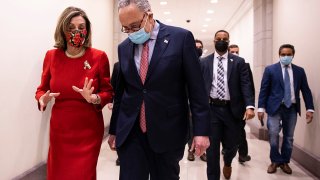
The $900 billion Covid relief bill unveiled by Congress this week provides an extra $300 weekly federal enhancement to the millions of Americans filing for unemployment across the country. But this new stimulus package also includes an additional $100 boost for some workers if their state chooses to supply it.
The supplement, included in the text of the relief bill, is intended to support workers who have both wage income, such as from a W-2 job, and self-employment or independent contractor earnings, like from a 1099 role, but whose benefit calculation doesn't take their self-employment earnings into account.
These individuals may be seeing an artificially low unemployment benefit, experts say, because their payments are based solely on wages reported on their annual W-2 tax forms, rather than including self-employment income, which may be much higher.
Take an entertainer, for example, who earns the bulk of his income through acting roles as an independent contractor, but also earns some money on the side through a W-2 restaurant job. If the entertainer loses work at the restaurant and qualifies for traditional unemployment, he won't be eligible for Pandemic Unemployment Assistance (PUA) available to freelance and gig workers. That means his weekly unemployment check will be lower because the income he made from the restaurant job is significantly less than what he earns freelancing. At minimum, PUA payments are equal to half of the state's average unemployment benefit and lasts for 39 weeks.
The extra $100 per week, on top of a $300 per week federal enhancement to everyone receiving jobless aid, is intended to make up for this gap.
Who is eligible for the extra $100
Workers who earned at least $5,000 in self-employment income in 2019 will be eligible for the extra $100 per week effective Dec. 27, 2020 through March 14, 2021.
Money Report
Right now, it's unclear how states will determine eligibility and administer the new $100 weekly payments. It's "highly unlikely" states will be able to proactively identify people newly eligible for this benefit, says Michele Evermore, a senior policy analyst at the National Employment Law Project. "Workers affected by this will definitely need to reach out to their state agencies to find out the process," she says.
There are between 10.5 million and 15 million independent contractors in the U.S., according to the Washington Center for Equitable Growth, which cited data from the Bureau of Labor Statistics and research conducted by academics at Harvard University and Princeton University.
Following passage of the bill, state unemployment offices will need to wait for federal guidance to determine how to administer new benefits to residents. They may also choose not to opt in, though given how states embraced measures from the CARES Act, that is unlikely. Furthermore, it may take a month or more to get this benefit up and running, Evermore adds, given that it's a new program and "states will have to find a way to move information across systems in a way they haven't had to in the past."
Experts have already predicted it will take three to six weeks to roll out the latest unemployment enhancements included in the $900 billion rescue package, which also provides a $300 weekly boost to all recipients and extends PUA and Pandemic Emergency Unemployment Compensation eligibility by 11 weeks into March 2021.
Even with the new relief bill, an estimated 12 million Americans and their families will experience a temporary lapse in jobless aid in January.
Check out:
New coronavirus relief bill includes $600 stimulus checks, $300 enhanced unemployment insurance
6 ways to manage burnout during a long job search
Don't miss: The best 0% APR credit cards so you can finance your debt or new purchases interest-free






